The Eurocadres blog
Atypical work – a new standard?
Eurocadres is partner of a project of the ETUC on atypical work and new forms of employment which started its activities in spring 2017. In workshops trade union experts from all over Europe exchange good trade union practices and discuss legislative actions supporting and improving the situation of these workers.

The three main topics covered by the project are on organising these workers as trade union members, access to social protection and collective bargaining practices.
far from being only the result of increasing digitalisation
The project initially started with the increasing awareness of the emergence of new forms of work centering around the debate on the widening use of digital techniques. It also highlighted the fact that “atypical” work, i.e. work which is not done in the context of a permanent, open-ended contract, may be quite typical in some sectors and increased knowledge about the variety of forms and legal definitions of atypical work, which are far from being only the result of increasing digitalisation[1]. Examples presented by the project participants concerned a variety of sectors such as Uber drivers in France, Finnish self-employed and freelance journalists in Germany as well as the arts and entertainment sector in Europe[2].The outcomes show that a variety of statutes and definitions exist for self-employed in the different countries and obstacles may take various forms.
Some countries or sectors have developed innovative means to guarantee access to social protection
The aforementioned complexity of atypical workers should not exclude equal access to social protection. Part-timers, temporary workers, free lancers and self-employed in their various forms tend not to have the same protections, or at least not the same scope of protections, as workers in open-ended contracts. Some countries or sectors have developed innovative means to guarantee access to social protection: Denmark, for example, extended the possibility for independent workers to use several legal statutes at the same time, while the Swedish media sector set up an alternative form of employment for actors in the form of a tripartite, state funded organisation which provides employment and training on the basis of a minimum total time of engagement. Further alternatives are co-operations between trade unions and cooperatives (such as Smart, Belgium) and the French example of “portage salarial”. Here highly qualified persons (generally professionals and managers) are employed under a collective agreement by companies, enabling them to access social protection under the obligation to look out for their clients by themselves.
If the economic crisis has increased precariousness, this had also an impact on qualified professionals.
For Eurocadres, the issue of self-employment is crucial: many qualified experts, professionals and managers are self-employed. If the economic crisis has increased precariousness, this had also an impact on qualified professionals. However, we might want to bear in mind that the world of the atypical contracts is not homogeneous: even statistical evidence gives different interpretations of the situations. And a share of the independent workers, especially in the high income quartiles, is attached to the freedom associated to their status.
[1]Studies from the European Social Observatory and the OECD ("The future of work") were of great relevance to gain insight into the complexity of “atypical work”.
[2] European research on "The future of work in the media arts and entertainment sector - Meeting the Challenge of Atypical Working" commissioned by the European Group of the International Federation of Actors

The author
Ute Meyenberg
Vice-President of Eurocadres
